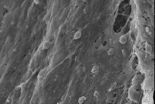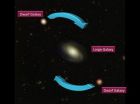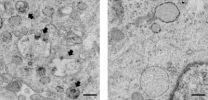(Press-News.org) TALLAHASSEE, Fla. — Could stuffing yourself full of high-fat foods cause you to lose your sense of smell?
A new study from Florida State University neuroscientists says so, and it has researchers taking a closer look at how our diets could impact a whole range of human functions that were not traditionally considered when examining the impact of obesity.
"This opens up a lot of possibilities for obesity research," said Florida State University post-doctoral researcher Nicolas Thiebaud, who led the study examining how high-fat foods impacted smell.
Thiebaud led the study in the lab of Biological Science Professor Debra Ann Fadool. Their work is published in the Journal of Neuroscience and shows that a high-fat diet is linked to major structural and functional changes in the olfactory system, which gives us our sense of smell.
It was the first time researchers had been able to demonstrate a solid link between a bad diet and a loss of smell.
The research was conducted over a six-month period where mice were given a high-fat daily diet, while also being taught to associate between a particular odor and a reward (water).
Mice that were fed the high-fat diets were slower to learn the association than the control population. And when researchers introduced a new odor to monitor their adjustment, the mice with the high-fat diets could not rapidly adapt, demonstrating reduced smell capabilities.
"Moreover, when high-fat-reared mice were placed on a diet of control chow during which they returned to normal body weight and blood chemistry, mice still had reduced olfactory capacities," Fadool said. "Mice exposed to high-fat diets only had 50 percent of the neurons that could operate to encode odor signals."
For Thiebaud and his colleagues, the results are opening up a whole new line of research. They will begin looking at whether exercise could slow down a high-fat diet's impact on smell and whether a high-sugar diet would also yield the same negative results on smell as a high-fat diet.
Funded by the National Institutes of Health (NIH), the study comes at an important time with obesity rates at all-time highs throughout the world. According to the NIH, more than two in three adults in the United States are considered to be overweight or obese. Additionally, about one-third of children and adolescents ages 6 to 19 are considered to be overweight or obese.
INFORMATION:
Thiebaud and Fadool were joined on the paper by colleagues from the University of West Georgia, Larry A. Ryle High School in Kentucky, the FSU Department of Mechanical Engineering and the FSU Institute of Molecular Biophysics.
New research links bad diet to loss of smell
2014-07-21
ELSE PRESS RELEASES FROM THIS DATE:
Study provides insights into birds' migration routes
2014-07-21
By tracking hybrids between songbird species, investigators have found that migration routes are under genetic control and could be preventing interbreeding. The research, which is published in Ecology Letters, was conducted using geolocators that, like GPS, record the position of a bird and allow its long distance movement to be tracked.
Compared with their parents, hybrids exhibited increased variability in their migratory routes: some used intermediate routes across less suitable areas, while others used the same routes as one parental group on fall migration and the ...
Motoneuron-like cell transplantation and GDNF delivery for repair of SCI
2014-07-21
Adipose-derived stem cells-transdifferentiated motoneurons after transplantation can integrate in the host cord. However, cell survival has been restricted by a lack of ideal environment for nerve cell growth. Taki Tiraihi, Shefa Neuroscience Research Center at Khatam Al-Anbia Hospital, Iran developed rat models of spinal cord injury (SCI) and injected adipose-derived stem cells-transdifferentiated motoneurons into the epicenter, rostral and caudal regions of the impact site and simultaneously transplanted glial cell line-derived neurotrophic factor (GDNF)-gelfoam complex ...
The development of blood-retinal barrier during astrocyte/vascular wall cell interaction
2014-07-21
There is evidence that astrocytes are closely related to the development and formation of retinal vessels. Dysfunction of astrocytes is an important cause of many retinal vascular disorders and blood-retinal barrier. Huanling Yao, Institute of Neurobiology, College of Life Science, Henan University, China, investigated development of the retinal vascular system and formation of the blood-retinal barrier in mice using immunofluorescence staining, gelatin-ink perfusion, and transmission electron microscopy. The development of the vasculature in the retina followed the rules ...
Using a novel scaffold to repair spinal cord injury
2014-07-21
Dr. Ning Yuan, Beijing Jishuitan Hospital, China and his colleagues, developed a novel neural stem cell scaffold that has two layers: the inner loose layer and the outer compact layer. The loose layer was infiltrated with a large amount of neural stem cells before it was transplanted in vivo. Thus a plenty of neural stem cells can be provided at the target spinal cord site. The loose layer was adhered to the injured side and the compact layer was placed against the lateral side. The compact layer has very small holes, so it can prevent ingrowth of adjacent scar tissue. ...
Using a deacetyl chitin conduit and short-term electrical stimulation for PNI
2014-07-21
Previous studies have demonstrated that deacetyl chitin conduit nerve bridging or electrical stimulation shows therapeutic effect on peripheral nerve injury (PNI). Dr. Peixun Zhang, Peking University People's Hospital, China and his team bridged the injured right rat sciatic nerve using a deacetyl chitin conduit combined with electrical stimulation (0.1 ms, 3 V, 20 Hz, for 1 hour). At 6 and 12 weeks after treatment, nerve conduction velocity, myelinated axon number, fiber diameter, axon diameter and the thickness of the myelin sheath in the stimulation group were better ...
Mysterious dance of dwarfs may force a cosmic rethink
2014-07-21
The discovery that many small galaxies throughout the universe do not 'swarm' around larger ones like bees do but 'dance' in orderly disc-shaped orbits is a challenge to our understanding of how the universe formed and evolved.
The finding, by an international team of astronomers, including Professor Geraint Lewis from the University of Sydney's School of Physics, has just been announced in Nature.
"Early in 2013 we announced our startling discovery that half of the dwarf galaxies surrounding the Andromeda Galaxy are orbiting it in an immense plane" said Professor ...
Study links enzyme to Alzheimer's disease
2014-07-21
Unclogging the body's protein disposal system may improve memory in patients with Alzheimer's disease (AD), according to a study from scientists at Kyungpook National University in Korea published in The Journal of Experimental Medicine.
In AD, various biochemical functions of brain cells go awry, leading to progressive neuronal damage and eventual memory loss. One example is the cellular disposal system, called autophagy, which is disrupted in patients with AD, causing the accumulation of toxic protein plaques characteristic of the disease. Jae-sung Bae and colleagues ...
Healing the heart with fat
2014-07-21
Too much dietary fat is bad for the heart, but the right kind of fat keeps the heart healthy, according to a paper published in The Journal of Experimental Medicine.
Unsaturated dietary fatty acids, such as eicosapentaenoic acid (EPA), are known to protect against cardiovascular diseases. However, the mechanism and the specific fat metabolites responsible for this protection were unknown.
A group of Japanese scientists now show that mice engineered to produce their own EPA are protected against heart disease and have improved cardiac function. One particular EPA metabolite, ...
When temperatures get cold, newly-discovered process helps fruit flies cope
2014-07-21
Cold-blooded animals cannot regulate their body temperature, so their cells are stressed when facing temperature extremes. Worse still, even at slightly colder temperatures, some biological processes in the cell are slowed down more than others, which should throw the cells' delicate chemical balance out of whack. Yet, those cells manage to keep their biological processes coordinated. Now researchers from the University of Rochester and the European Molecular Biology Laboratory have found out how they do that.
"The production of proteins is a key process in all cells, ...
Scientists successfully generate human platelets using next-generation bioreactor
2014-07-21
Boston, MA – Scientists at Brigham and Women's Hospital (BWH) have developed a scalable, next-generation platelet bioreactor to generate fully functional human platelets in vitro. The work is a major biomedical advancement that will help address blood transfusion needs worldwide.
The study is published July 21, 2014 in Blood.
"The ability to generate an alternative source of functional human platelets with virtually no disease transmission represents a paradigm shift in how we collect platelets that may allow us meet the growing need for blood transfusions," said Jonathan ...





